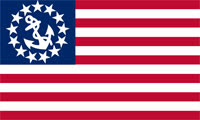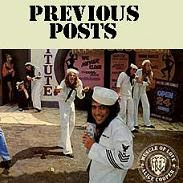Britain Demands Iran Free Seized Sailors
Naval forces of Iran's hardline Revolutionary Guards captured 15 British sailors and marines at gunpoint Friday in the Persian Gulf _ a provocative move coming during heightened tensions between the West and Iran. U.S. and British officials said a boarding party from the frigate HMS Cornwall was seized about 10:30 a.m. during a routine inspection of a merchant ship inside Iraqi territorial waters near the disputed Shatt al-Arab waterway. Iran's Foreign Ministry insisted the Britons were operating in Iranian waters and would be held "for further investigation," Iranian state television said. A U.S. Navy official in Bahrain, Cmdr. Kevin Aandahl, said Iran's Revolutionary Guard naval forces were responsible and had broadcast a brief radio message saying the British party was not harmed. In London, the British government summoned the Iranian ambassador to the Foreign Office, and Foreign Secretary Margaret Beckett said he "was left in no doubt that we want them back." Iranian TV quoted an Iranian Foreign Ministry official as saying the top British diplomat in Tehran had been called in to receive Tehran's protest of the "illegal entry" into Iranian waters. "This is not the first time that British military personnel during the occupation of Iraq have entered illegally into Iran's territorial waters," the unidentified official was quoted as saying.
HMS Cornwall (F99) Britain's Defense Ministry said the Royal Navy personnel were "engaged in routine boarding operations of merchant shipping in Iraqi territorial waters" and had completed a ship inspection when they were accosted by Iranian vessels. The eight Royal Navy sailors and seven Royal Marines were part of a task force that protects Iraqi oil terminals and maintains security in Iraqi waters under authority of the U.N. Security Council. The Cornwall's commander, Commodore Nick Lambert, said the frigate lost communication with the boarding party, but a helicopter crew saw Iranian naval vessels approach. "I've got 15 sailors and marines who have been arrested by the Iranians and my immediate concern is their safety," he told British Broadcasting Corp. television. Lambert said he hoped it was a "simple mistake" stemming from the long dispute between Iraq and Iran over demarcating their territorial waters just off the mouth of the Shatt al-Arab, a waterway that divides the two countries. White House press secretary Tony Snow said the Bush administration was monitoring events. "The British government is demanding the immediate safe return of the people and equipment and we are keeping watch on the situation," Snow said. The incident occurred as the U.N. Security Council debates expanding sanctions against Iran seeking to force Tehran to suspend uranium enrichment. The U.S. and other nations suspect Iran is trying to produce nuclear weapons. Iran denies that and insists it won't halt the program. Iran's leaders also have denied allegations by the U.S., Britain and others that Iranians are arming Shiite Muslim militias in Iraq. Hours before the seizure of the Royal Navy team, British Lt. Col. Justin Maciejewski told BBC Radio 4's "Today" program from the Iraqi city of Basra that Iranians provided weapons and money to militants who are attacking British troops in southern Iraq. The U.S. military has leveled similar charges, saying Iranians send arms to Iraqi extremists, including sophisticated roadside bombs. This week, two commanders of an Iraqi Shiite militia told reporters in Baghdad that hundreds of Iraqi Shiites had crossed into Iran for training by the elite Quds force, a branch of Iran's Revolutionary Guard thought to have trained Hezbollah guerrillas in Lebanon. With tensions running high, the United States has bolstered its naval forces in the Persian Gulf in a show of strength directed at Iran.
 A strike group led by the aircraft carrier USS John C. Stennis recentl joined a similar force led by the carrier USS Dwight D. Eisenhower. U.S. officials have expressed concern that with so much military hardware in the Gulf, a small incident like Friday's could escalate into a dangerous confrontation. Ayatollah Ali Khamenei, Iran's supreme leader, warned this week that if Western countries "treat us with threats and enforcement of coercion and violence, undoubtedly they must know that the Iranian nation and authorities will use all their capacities to strike enemies that attack." The seizure of two Royal Navy inflatable boats took place just outside the mouth of the Shatt al-Arab waterway, a 125-mile channel dividing Iraq from Iran. Its name means Arab Coastline in Arabic, and Iranians call it Arvandrud _ Persian for Arvand River. A 1975 treaty recognized the middle of the waterway as the border. Iraqi leader Saddam Hussein canceled the treaty five years later and invaded Iran, triggering an eight-year war. "It's been in dispute for some time," said Aandahl, the U.S. Navy official in Bahrain. "We've been operating there for a couple of years and we know the lines very well. This was a compliant boarding, this happens routinely. What's out of the ordinary is the Iranian response." In June 2004, six British marines and two sailors were seized by Iran in the Shatt al-Arab. They were presented blindfolded on Iranian television and admitted entering Iranian waters illegally, then released unharmed after three days. Vali Nasr, a senior fellow for Middle East Studies at the Council on Foreign Relations, suggested Friday's detention could be connected to the arrest of five Iranians in a U.S.-led raid in northern Iraq in January. The U.S. said the five included a Revolutionary Guard general. "I think Iran sees this as retaliation for the arrest of their own personnel. They have repeatedly said that they want their personnel released," Nasr said. "So they are either signaling that they can do the same thing or they are trying to bring attention to it."
A strike group led by the aircraft carrier USS John C. Stennis recentl joined a similar force led by the carrier USS Dwight D. Eisenhower. U.S. officials have expressed concern that with so much military hardware in the Gulf, a small incident like Friday's could escalate into a dangerous confrontation. Ayatollah Ali Khamenei, Iran's supreme leader, warned this week that if Western countries "treat us with threats and enforcement of coercion and violence, undoubtedly they must know that the Iranian nation and authorities will use all their capacities to strike enemies that attack." The seizure of two Royal Navy inflatable boats took place just outside the mouth of the Shatt al-Arab waterway, a 125-mile channel dividing Iraq from Iran. Its name means Arab Coastline in Arabic, and Iranians call it Arvandrud _ Persian for Arvand River. A 1975 treaty recognized the middle of the waterway as the border. Iraqi leader Saddam Hussein canceled the treaty five years later and invaded Iran, triggering an eight-year war. "It's been in dispute for some time," said Aandahl, the U.S. Navy official in Bahrain. "We've been operating there for a couple of years and we know the lines very well. This was a compliant boarding, this happens routinely. What's out of the ordinary is the Iranian response." In June 2004, six British marines and two sailors were seized by Iran in the Shatt al-Arab. They were presented blindfolded on Iranian television and admitted entering Iranian waters illegally, then released unharmed after three days. Vali Nasr, a senior fellow for Middle East Studies at the Council on Foreign Relations, suggested Friday's detention could be connected to the arrest of five Iranians in a U.S.-led raid in northern Iraq in January. The U.S. said the five included a Revolutionary Guard general. "I think Iran sees this as retaliation for the arrest of their own personnel. They have repeatedly said that they want their personnel released," Nasr said. "So they are either signaling that they can do the same thing or they are trying to bring attention to it."

 A strike group led by the aircraft carrier USS John C. Stennis recentl joined a similar force led by the carrier USS Dwight D. Eisenhower. U.S. officials have expressed concern that with so much military hardware in the Gulf, a small incident like Friday's could escalate into a dangerous confrontation. Ayatollah Ali Khamenei, Iran's supreme leader, warned this week that if Western countries "treat us with threats and enforcement of coercion and violence, undoubtedly they must know that the Iranian nation and authorities will use all their capacities to strike enemies that attack." The seizure of two Royal Navy inflatable boats took place just outside the mouth of the Shatt al-Arab waterway, a 125-mile channel dividing Iraq from Iran. Its name means Arab Coastline in Arabic, and Iranians call it Arvandrud _ Persian for Arvand River. A 1975 treaty recognized the middle of the waterway as the border. Iraqi leader Saddam Hussein canceled the treaty five years later and invaded Iran, triggering an eight-year war. "It's been in dispute for some time," said Aandahl, the U.S. Navy official in Bahrain. "We've been operating there for a couple of years and we know the lines very well. This was a compliant boarding, this happens routinely. What's out of the ordinary is the Iranian response." In June 2004, six British marines and two sailors were seized by Iran in the Shatt al-Arab. They were presented blindfolded on Iranian television and admitted entering Iranian waters illegally, then released unharmed after three days. Vali Nasr, a senior fellow for Middle East Studies at the Council on Foreign Relations, suggested Friday's detention could be connected to the arrest of five Iranians in a U.S.-led raid in northern Iraq in January. The U.S. said the five included a Revolutionary Guard general. "I think Iran sees this as retaliation for the arrest of their own personnel. They have repeatedly said that they want their personnel released," Nasr said. "So they are either signaling that they can do the same thing or they are trying to bring attention to it."
A strike group led by the aircraft carrier USS John C. Stennis recentl joined a similar force led by the carrier USS Dwight D. Eisenhower. U.S. officials have expressed concern that with so much military hardware in the Gulf, a small incident like Friday's could escalate into a dangerous confrontation. Ayatollah Ali Khamenei, Iran's supreme leader, warned this week that if Western countries "treat us with threats and enforcement of coercion and violence, undoubtedly they must know that the Iranian nation and authorities will use all their capacities to strike enemies that attack." The seizure of two Royal Navy inflatable boats took place just outside the mouth of the Shatt al-Arab waterway, a 125-mile channel dividing Iraq from Iran. Its name means Arab Coastline in Arabic, and Iranians call it Arvandrud _ Persian for Arvand River. A 1975 treaty recognized the middle of the waterway as the border. Iraqi leader Saddam Hussein canceled the treaty five years later and invaded Iran, triggering an eight-year war. "It's been in dispute for some time," said Aandahl, the U.S. Navy official in Bahrain. "We've been operating there for a couple of years and we know the lines very well. This was a compliant boarding, this happens routinely. What's out of the ordinary is the Iranian response." In June 2004, six British marines and two sailors were seized by Iran in the Shatt al-Arab. They were presented blindfolded on Iranian television and admitted entering Iranian waters illegally, then released unharmed after three days. Vali Nasr, a senior fellow for Middle East Studies at the Council on Foreign Relations, suggested Friday's detention could be connected to the arrest of five Iranians in a U.S.-led raid in northern Iraq in January. The U.S. said the five included a Revolutionary Guard general. "I think Iran sees this as retaliation for the arrest of their own personnel. They have repeatedly said that they want their personnel released," Nasr said. "So they are either signaling that they can do the same thing or they are trying to bring attention to it."



















<< Home